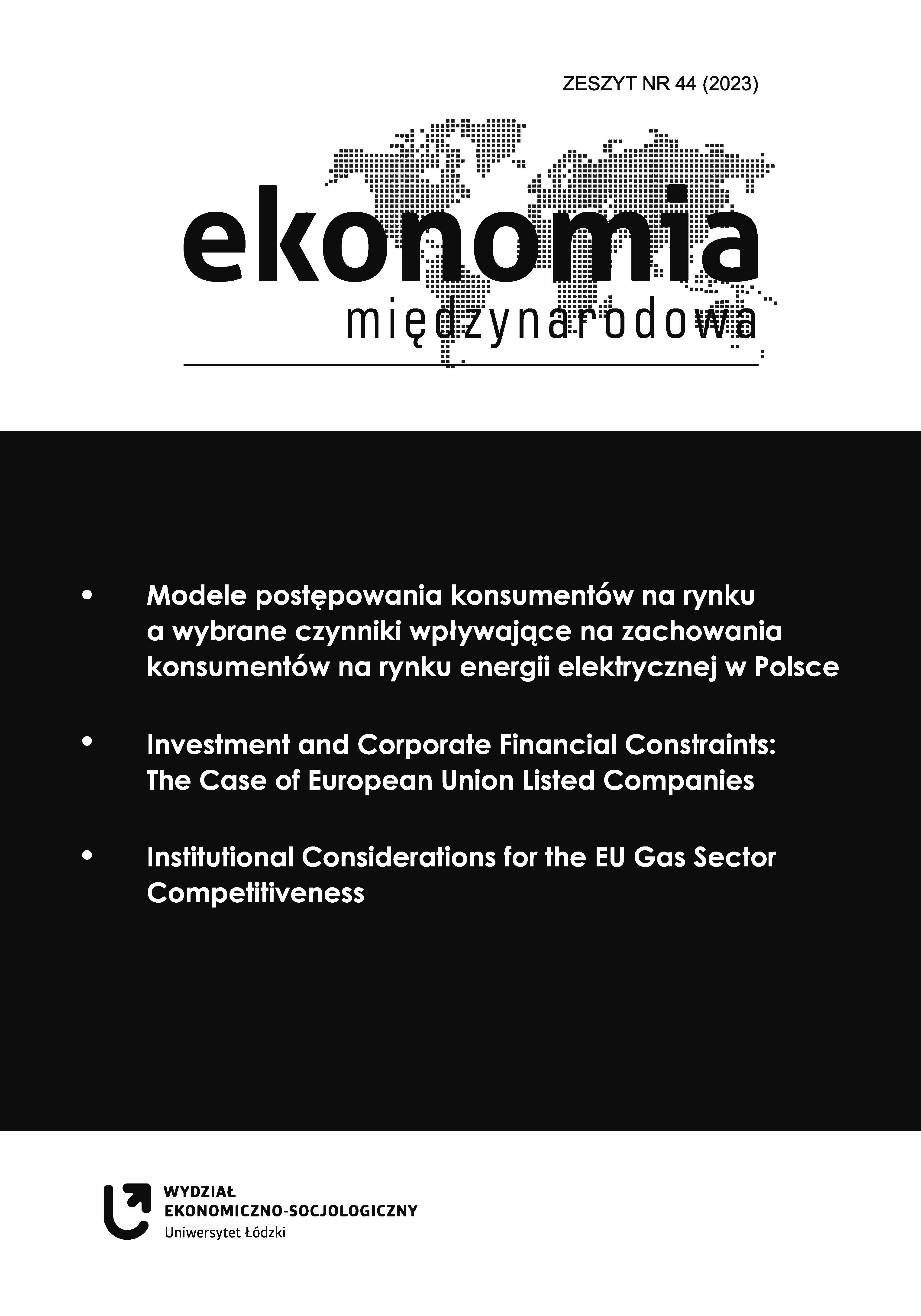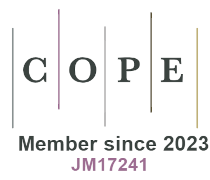Institutional Considerations for the EU Gas Sector Competitiveness
DOI:
https://doi.org/10.18778/2082-4440.44.03Keywords:
gas market, liberalization, sectoral competitivenessAbstract
The study explores the subject of sectoral competitiveness on the example of gas sectors in different European countries. Literature review on sectoral competitiveness suggests that the concept has evolved considerably over time and that contemporary definitions of competitiveness span beyond traditional economic factors. Studies on gas sector in this context to date, however, have largely focused on export competitiveness of upstream activities. To address the research gap, a targeted approach is suggested to study and compare competitiveness of the entire national gas sectors, spanning beyond standard productivity measures. A dedicated synthetic indicator is designed to perform a comparative analysis of contemporary gas sectors, taking account of the gas price offered to the industry, institutional performance, infrastructure readiness and job creation potential. Then, the case study is presented and it examines four countries that have liberalized their gas sectors and are reliant on gas imports to a different degree. Results confirm that the application of a synthetic indicator factoring in different aspects of sectoral competitiveness is appropriate to arrive at a holistic view of gas sector’s relative performance. The significance of the institutional setup is also confirmed from the perspective of inducing investment, enhancing market liquidity, as well as creating sustainable jobs in the gas sector.
References
Agency for the Cooperation of Energy Regulators (ACER), (2023), European gas market trends and price drivers, ACER 2023 Market Monitoring Report, Ljubljana.
Google Scholar
Aiginger K., Bärenthaler-Sieber S., Vogel J. (2013), Competitiveness under New Perspectives, OECD Working Paper, vol. 44.
Google Scholar
Al-Shafi M., Massarweh O., Abushaikha A.S., Bicer Y. (2023), A review on underground gas storage systems: Natural gas, hydrogen and carbon sequestration, “Energy Reports”, vol. 9.
Google Scholar
DOI: https://doi.org/10.1016/j.egyr.2023.05.236
Banet C. (2023), Building Europe’s Hydrogen and Renewable Gas Market, Centre on Regulation in Europe, Brussels.
Google Scholar
Beale E., Beugin D., Dahlby B., Drummond D., Olewiler N., Ragan C. (2015), Provincial Carbon Pricing and Competitiveness Pressures, Canada’s Ecofiscal Commission, Montreal.
Google Scholar
Bluszcz A. (2020), Multidimensional comparative analysis as a tool for assessing the level of development of energy markets in selected European countries, IOP Conference Series: Earth and Environmental Science, vol. 609(1).
Google Scholar
DOI: https://doi.org/10.1088/1755-1315/609/1/012020
Bros A., Mitrova T., Westphal K. (2017), German-Russian Gas Relations. A Special Relationship in Troubled Waters, SWP Research Papers, vol. 13(1).
Google Scholar
Bros T. (2017), Brexit’s Impact on Gas Markets. Irish options: IBP, NBP or TTF?, OIES Energy Comment, Oxford.
Google Scholar
Cardinale R. (2023). Liberalization and the volatility of gas prices: Exploring their relation in times of abundance and scarcity, “Competition and Regulation in Network Industries”, 24(2–3).
Google Scholar
DOI: https://doi.org/10.1177/17835917231180839
Chikán A. (2008), National and firm competitiveness: a general research model. Competitiveness Review, “International Business Journal”, 18(1/2).
Google Scholar
DOI: https://doi.org/10.1108/10595420810874583
Council of European Energy Regulators (CEER), (2011), Draft Vision for a European Gas Target Model, CEER, Brussels.
Google Scholar
Danish Energy Agency (DEA) (2021), Green Gas Strategy, DEA, Copenhagen.
Google Scholar
Department for Business, Energy and Industrial Strategy (BEIS), (2021), Final Stage IA Assessment for the Green Gas Support Scheme/Green Gas Levy, BEIS, London.
Google Scholar
Department for Energy Security & Net Zero (2023), Green Gas Support Scheme Mid-Scheme Review, Department for Energy Security & Net Zero, London.
Google Scholar
Dukhanina E., Massol O., Leveque F. (2019), Policy measures targeting a more integrated gas market: Impact of a merger of two trading zones on price and arbitrage activity in France, “Energy Policy”, 132.
Google Scholar
DOI: https://doi.org/10.1016/j.enpol.2019.05.044
European Biogas Association (EBA), (2015), United Kingdom, EBA, Brussels.
Google Scholar
Flejterski S. (1984), Istota i mierzenie konkurencyjności międzynarodowej, “Gospodarka Planowa”, 39(9).
Google Scholar
Halkos G. (2020), Examining the level of competition in the energy sector, “Energy Policy”, 134.
Google Scholar
DOI: https://doi.org/10.1016/j.enpol.2019.110951
Harvey M. (2014), The Food-Energy-Climate Change Trilemma: Toward a Socio-Economic Analysis, “Theory, Culture & Society”, 31(5).
Google Scholar
DOI: https://doi.org/10.1177/0263276414537317
Hashimoto S. (2022), The Importance of Government Support for Pipeline Network Construction, [in:] R. Sayeed, A.I. Mohamed (eds.), Pipeline Engineering – Design, Failure, and Management, IntechOpen, London.
Google Scholar
DOI: https://doi.org/10.5772/intechopen.108841
Heather P. (2019), European Traded Gas Hubs: a decade of change, OIES Energy Insight 55, Oxford.
Google Scholar
Heather P. (2021a), European Traded Gas Hubs: German hubs about to merge, OIES Paper: NG 170, Oxford.
Google Scholar
Honore A. (2020), Natural gas demand in Europe: The impacts of Covid-19 and other influences in 2020, OIES Energy Comment, Oxford.
Google Scholar
Hulshof D., van der Maat J., Mulder M. (2016). Market fundamentals, competition and natural-gas prices, “Energy Policy”, 94.
Google Scholar
DOI: https://doi.org/10.1016/j.enpol.2015.12.016
International Energy Agency (IEA), (2013), Energy Policies of IEA countries: Germany 2013, IEA, Paris.
Google Scholar
International Energy Agency (IEA), (2021), Implementation of bioenergy in Germany – 2021 update, IEA, Paris.
Google Scholar
International Energy Agency (IEA), (2022), Natural Gas-Fired Electricity, IEA, Paris.
Google Scholar
International Energy Agency (IEA), (2023), Denmark 2023. Energy Policy Review, IEA, Paris.
Google Scholar
Jain S. (2019), Market report: Germany, World Biogas Association, London.
Google Scholar
Juris A. (1998), Market Development in the U.K. Natural Gas Industry: The Emergence of Spot, Financial and Pipeline Capacity Markets, World Bank, Washington.
Google Scholar
Kabeyi M.J.B., Olanrewaju O.A. (2022), Biogas Production and Applications in the Sustainable Energy Transition, “Journal of Energy”, 2022.
Google Scholar
DOI: https://doi.org/10.1155/2022/8750221
Kettner C., Wretschitsch E. (2023), Taxes and Subsidies in EU Energy Policy – Fit for 55?, Österreichisches Institut für Wirtschaftsforschung Working Papers 656, Vienna.
Google Scholar
Kulikov G. (2000), Japonskij menedzhment i teorija mezhdunarodnoj konkurentosposobnosti Ekonomika as cited, [in:] G. Kharlamova, O. Vertieleva (2013) International Competitiveness of Countries: Economic-Mathematical approach, “Economics and Sociology“, 6(2).
Google Scholar
DOI: https://doi.org/10.14254/2071-789X.2013/6-2/4
Law no 2015-992 du 17 août 2015 relative à la transition énergétique pour la croissance verte (1), Journal Officiel De La République Française, DEVX1413992L.
Google Scholar
Le Fevre C. (2013), Gas Storage in Great Britain, OIES Paper: NG 72, Oxford.
Google Scholar
DOI: https://doi.org/10.26889/9781907555657
Manyika J., Mendonca L., Remes J., Klussmann S., Dobbs R., Karkun K., Klinstov V., Kuekenshoener C., Nikomarov M., Roxburgh C., Schubert J., Tacke T., Toermanen A. (2010), How to compete and grow: A sector guide to policy, McKinsey Global Institute, New York.
Google Scholar
Mejia J., Aliakbari E. (2022), Canada-US Energy Sector Competitiveness Survey 2022, Fraser Institute, Vancouver.
Google Scholar
Naef I. (2024), The impossible love of fossil fuel companies for carbon taxes, “Ecological Economics”, 217.
Google Scholar
DOI: https://doi.org/10.1016/j.ecolecon.2023.108045
Navigant (2019), Job creation by scaling up renewable gas in Europe, Navigant Netherlands B.V., Utrecht.
Google Scholar
Porter M. (1990). The Competitive Advantage of Nations, “Harvard Business Review”, 3.
Google Scholar
DOI: https://doi.org/10.1007/978-1-349-11336-1
Robb S. (2022), Denmark heads for 100% biomethane by 2030, “Irish Farmers Journal”, 12.
Google Scholar
Romero-Marquez I., Moreno-Bird J.C. (2015), Export competitiveness in an oil and gas economy: the case of Trinidad and Tobago, 1985–2010, “Cepal Review”, 117.
Google Scholar
DOI: https://doi.org/10.18356/4ef7998b-en
Scarlat N., Dallemand J.F. (2011), Status of the implementation of biofuels and bioenergy certification systems. Major implications, reporting constraints and implementation controls, Publications Office of the European Union, Luxembourg.
Google Scholar
Schwab K. (2013), The Global Competitiveness Report 2013–2014, World Economic Forum Insight Report, Geneva.
Google Scholar
Siudek T., Zawojska A. (2014), Competitiveness in the Economic Concepts, Theories and Empirical Research, “Oeconomia”, 13(1).
Google Scholar
Soltani M., Hajipour B., Tayebinia J. (2021), Identifying the factors affecting competitiveness: A case study of Iranian natural gas industry, “Energy Strategy Reviews”, 36.
Google Scholar
DOI: https://doi.org/10.1016/j.esr.2021.100674
Thomas S. (2005), The European Union Gas and Electricity Directives, Research Institute of the University of Greenwich, Greenwich.
Google Scholar
United Nations Economic Commission for Europe (2013), Study on Underground Gas Storage in Europe and Central Asia, United Nations, Geneva.
Google Scholar
Van Stiphout M. (2023), Gas Quality Standards in the European Union. The need to develop European gas quality standards to achieve market integration and a competitive gas appliance market, International Gas Union, London.
Google Scholar
Wright P. (2005). Liberalisation and the security of gas supply in the UK, “Energy Policy”, 33(17).
Google Scholar
DOI: https://doi.org/10.1016/j.enpol.2004.04.022
Yafimava K. (2017), The OPAL Exemption Decision: a comment on the CJEU’s ruling to reject suspension, “Oxford Energy Insights”, 18(1).
Google Scholar
DOI: https://doi.org/10.26889/ei201709
Bundesnetzagentur (BNetzA), (2014–2022), Marktstammdatenregister, https://www.marktstammdatenregister.de/MaStR/Einheit/Einheiten/OeffentlicheEinheitenuebersicht#gaserzeugung
Google Scholar
European Commission (2014–2022), Gas Market Report, https://circabc.europa.eu/ui/group/3ef9355f-1ffe-4c82-ba19-f60a3ed2f652/library/295bae48-18a2-4901-afbe-edc7dcd40dee?p=1&n=10&sort=modified_DESC
Google Scholar
European Federation of Energy Traders (EFET), (2014–2022), European Gas Hub Study, https://efet.org/home/documents?id=19
Google Scholar
Eurostat (2014–2022), Statistical Data Warehouse, https://ec.europa.eu/eurostat/web/energy/database
Google Scholar
Gas Infrastructure Europe (GIE), (2014–2022a), LNG Database, https://agsi.gie.eu/
Google Scholar
Gas Infrastructure Europe (GIE), (2014–2022b), Storage Database, https://agsi.gie.eu/
Google Scholar
International Energy Agency (IEA), (2014–2022), Energy policies of IEA countries, https://www.oecd-ilibrary.org/energy/energy-policies-of-iea-countries_19900082
Google Scholar
Ministere de la Transition Ecologique (2014–2022), Data Lab, https://www.statistiques.developpement-durable.gouv.fr/edition-numerique/chiffres-cles-energies-renouvelables-2021/index
Google Scholar
Published
Versions
- 2024-07-15 (2)
- 2023-12-30 (1)
How to Cite
Issue
Section
License

This work is licensed under a Creative Commons Attribution-NonCommercial-NoDerivatives 4.0 International License.









